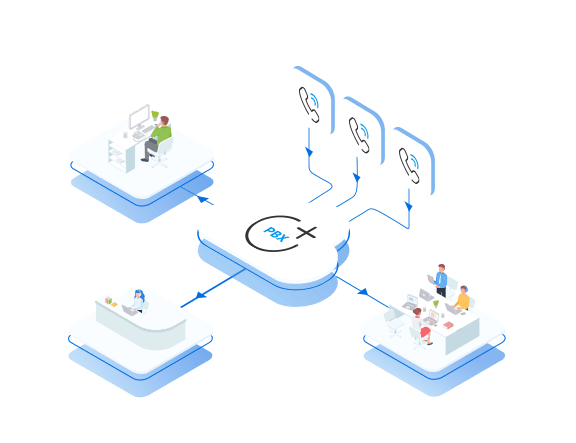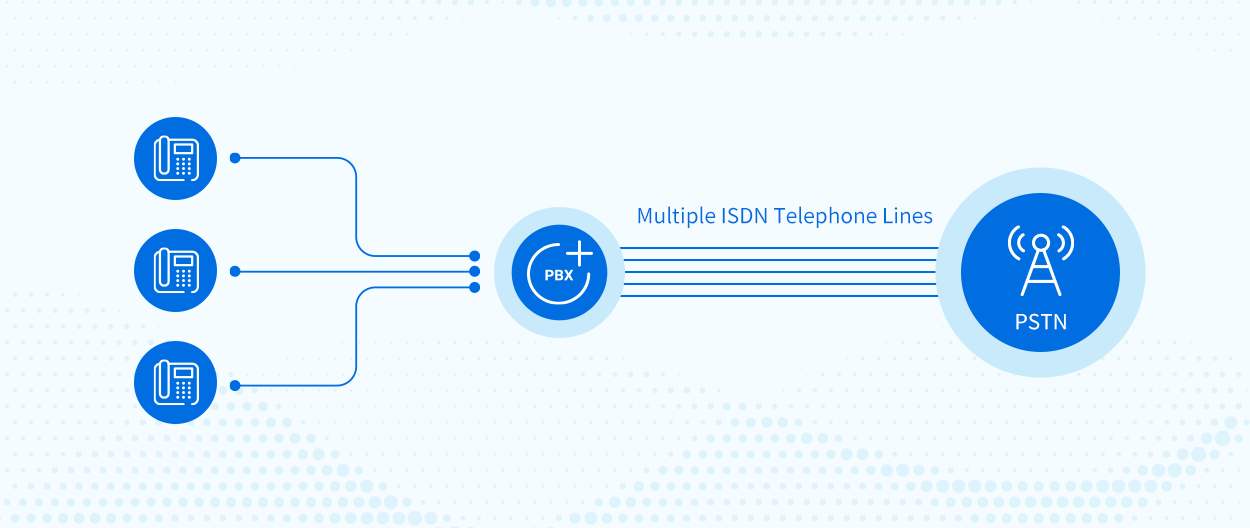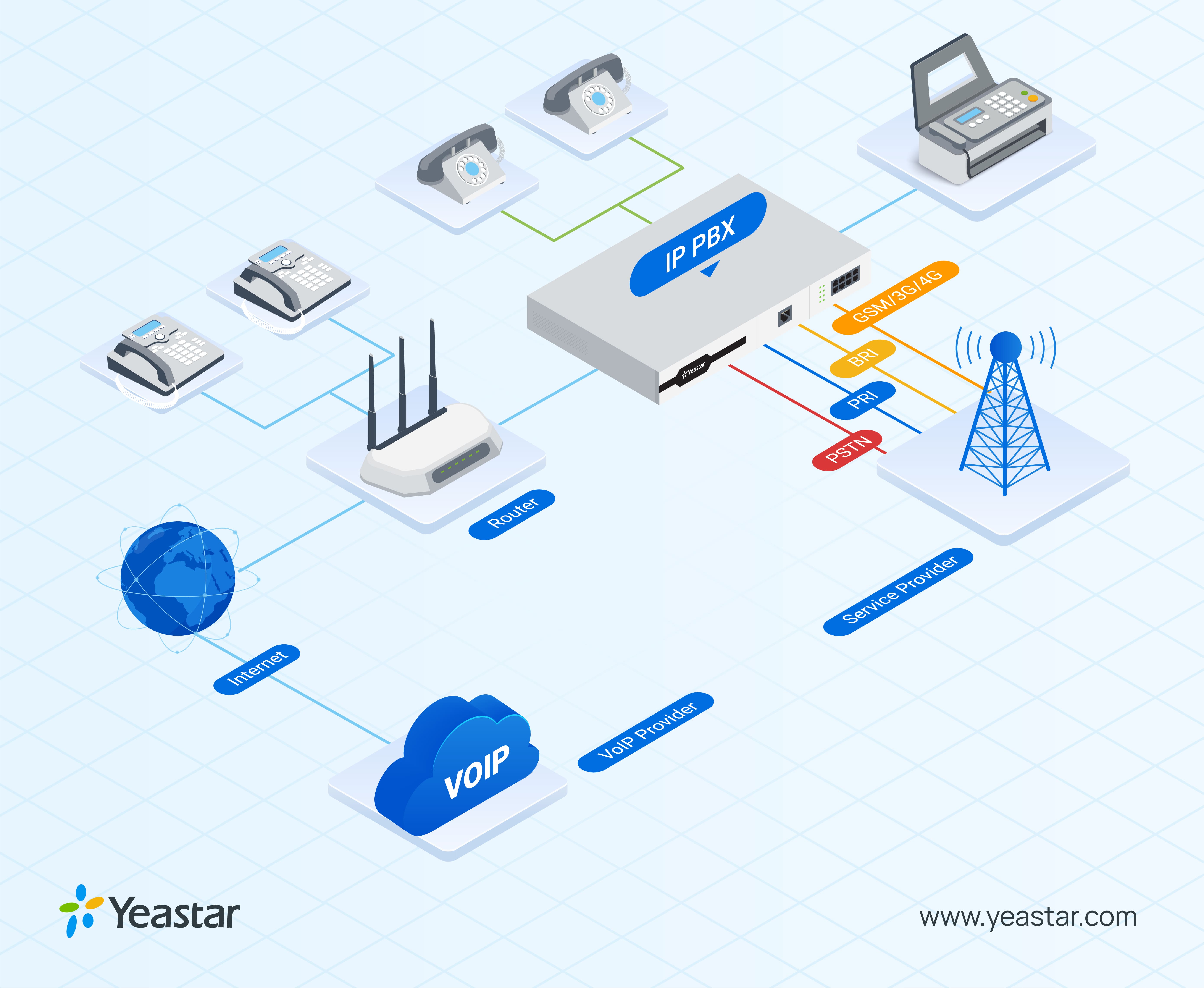 Have you been considering upgrading your business phone system? If so, you may be wondering if a multi-line phone system is a good choice for your business.
Have you been considering upgrading your business phone system? If so, you may be wondering if a multi-line phone system is a good choice for your business.
In this guide, we’ll discuss some of the key reasons you might consider using a multi-line phone system for your business. We will talk about the different types of multi-line systems available and what each one can offer. We will also discuss some of the main benefits and features that are important to look for when choosing a multi-line phone system.
Table of Contents
- What Is a Multi-Line Phone System? →
- How Does a Multi-Line Phone System Work? →
- Types of Multi-Line Phone Systems →
- Why Consider a VoIP Multi-Line Phone System? →
- Benefits of a VoIP Multi-line Phone System →
- Features of a Multi-Line Phone System →
- In Summary →
- FAQs →
What Is a Multi-Line Phone System?
A multi-line phone system is a type of telephone system that allows multiple phone lines to be connected to a single device or phone system. This enables users to handle multiple incoming and outgoing calls simultaneously on different lines.
There are two main types of multi-line phone systems, traditional analog systems and modern digital systems.
Analog Multi-Line Phone Systems
The most basic analog option is to use the existing wires to create a two-line service out of a single landline. These would be connected to the phone jacks using yellow and black cables. The additional line would come at an extra cost from the phone company. Obviously, if you need more than two lines, this option quickly becomes expensive and impractical.
The other type is a traditional PBX system, which is a private branch exchange. A traditional PBX system uses a physical control unit to manage the phone lines. This system requires special wiring and equipment, and it can be difficult to expand if you need to add more phone lines in the future. Additionally, Analog Multi-line PBX systems are more expensive to maintain than VoIP systems. This is why digital systems in most modern businesses are replacing traditional phone systems.
VoIP Multi-Line Phone Systems
A more modern and efficient option is based on VoIP (Voice over Internet Protocol) technology. VoIP stands for Voice Over Internet Protocol and refers to how data packets are delivered through the Internet rather than traditional landlines like those used by analog phones. These systems use your existing internet connection to make and receive calls. This eliminates the need for physical phone lines, which can save you a significant amount of money on your monthly phone bill. A VoIP multi-line phone system is also easier to scale than an analog system so that it can grow with your business.
How Does a Multi-Line Phone System Work?
Analog and VoIP multi-line phone systems work in very different ways.
With an analog system, each call that was made took up its own physical line. This meant that if you had five lines coming into your office, and all five were in use, then someone calling in would get a busy signal.

However, with VoIP, your voice is converted into digital data and sent over the internet. This data can then be compressed so that multiple calls can share the same physical line. You can also use a hosted PBX, which is a cloud-based service that provides you with all the features and functionality of an on-premises PBX without the need to install any hardware or software. All that is required is a reliable internet connection.

Types of Multi-Line Phone Systems
Multi-line phone systems can be broken down into the number of lines they support. The most common systems are 2-line, 4-line, and systems with 6 lines or more.
2-Line/4-Line/6-Line Phone Systems
Multi-line phones are like having multiple phones in one.
A 2-line phone system is the most basic type of multi-line system and is typically used by solopreneurs, small businesses, or home offices. These systems have two lines that can be used simultaneously so that you can take two calls at the same time.
A 4-line phone system is a good option for small businesses that need a little more than a 2-line system. With four lines, you can take four calls at the same time, which is perfect for businesses with a moderate amount of call volume.
If you have a high volume of calls coming into your business, then you’ll need a multiline phone system with six lines or more. These systems can be custom-tailored to your business needs and support as many lines as required.
Flexible Phone System
A flexible multi-line system is the best option for businesses that expect to grow or might be busier at certain times of the day or week. A flexible VoIP phone system allows you to add or remove lines as your business needs change. This can be an excellent option for businesses that have seasonal fluctuations in their call volume or are expecting to grow in the near future.
This is where VoIP phone systems differ from traditional phone systems in that you can rapidly increase the number of calls you receive. In addition, you don’t need to purchase additional VoIP desk phones as you can use an app that turns your computer or mobile device into a VoIP phone. This allows you to field multiple phone lines even when you’re on the go or have staff working remotely.
Why a Business Should Consider a VoIP Multi-Line Phone System?
Modern communication technology has come a long way, and there are several reasons why your business should consider switching to a digital multi-line phone system. We will discuss the different benefits in-depth shortly, but in brief, a digital multi-line phone system will save your business money, provide you with more features and flexibility, and give you the ability to scale as your business grows.
Benefits of a VoIP Multi-line Phone System
A multi-line phone system can be a great asset for any business, large or small. Perhaps the most obvious benefit is the ability to have multiple calls coming in at the same time. This can be a real lifesaver during busy periods when every call counts. Let’s explore some of the other advantages of multi-line phone systems.
Cost Savings
VoIP multi-line phone systems are becoming increasingly popular primarily because they can save businesses a significant amount of money. With VoIP, you make and receive calls using an internet connection instead of a traditional phone line. VoIP systems are typically much less expensive to install and maintain than traditional systems. In addition, VoIP calls are often cheaper than traditional calls, and VoIP systems often come with a host of features that would be costly or impossible to add to a traditional system.
For example, VoIP multi-line phone systems can be used to create an auto-attendant, which can route calls and take messages without the need for a receptionist. This can lead to further savings on labor costs.
Greater Flexibility
With a cloud-based system, your calls are routed through the internet, so you can make and receive calls on your laptop, smartphone, or tablet. This can be a big advantage if you have employees who work remotely or travel frequently. This flexibility allows your team to be more productive, as they can make and receive calls whether they’re in the office, working from home, or anywhere else with internet access.
Increased Productivity
Every business owner wants their company to run as efficiently as possible. A multi-line phone system can give your business a significant boost in productivity when it comes to communication. By having multiple lines, incoming calls will never go unanswered, and employees will be able to place outbound calls without having to wait for a line to become available. In addition, a VoIP multi-line system can also help to streamline your company’s internal communications. With features like call forwarding and conference calling, team members will be able to collaborate more effectively and get tasks completed promptly.
We’ve already discussed how a cloud-based multi-line phone system can allow your employees to be flexible in their work locations, but this also fits firmly into the productivity camp. With a cloud-based system, your employees can take their business calls from anywhere. This means they can work from home, on the road, or even at a client’s office. As a result, they’ll be able to stay connected and be more productive, even when they’re out of the office.
A multi-line telephone system can make all the difference if you want your business to operate at peak efficiency.
Easy to Scale
As your small business grows, it’s important to have a phone system that can scale with you. Adding new lines can be expensive and time-consuming with a traditional multi-line business phone system. With a VoIP system, adding new users is as simple as creating a new account and assigning them a phone number. This makes adding new employees or departments easy without incurring additional costs or disrupting your existing service.
For example, if you’re expecting a surge in call volume, you can add additional lines to your system quickly and easily. Similarly, if you need to reduce your service due to a decrease in call volume, you can remove lines just as easily. This scalability can be a big advantage for businesses that experience fluctuating call volume or seasonal spikes.
Professional Image
In today’s competitive business world, first impressions are important. When customers call your business, they should reach a professional-sounding phone system that makes it easy to navigate and get the information they need. A VoIP multi-line phone system can give your business a professional image at an affordable price.
In addition to providing multiple lines for incoming calls, a multi-line system can also offer features like caller ID and call waiting. This can give your business a more efficient and organized appearance, which can help impress potential clients.
What’s more, a multi-line phone system can be a valuable tool for businesses that receive a high volume of calls. Having multiple lines available lets you ensure that each call is answered promptly and efficiently.
Ultimately,a multi-line phone system can help your business run more smoothly and efficiently, giving you a competitive edge.
Features of a Multi-Line Phone System
Now that we’ve discussed some of the benefits of using a VoIP multi-line phone system let’s look at some of the advanced features you should look for when choosing a system for your business.
Auto Attendant
An auto attendant is an automated menu that gives callers the option to be transferred to different departments or extensions. Auto-attendant can be a great way to improve customer service as it allows callers to be directed to the right person quickly and efficiently.
Call Waiting
Call waiting is a feature that allows you to answer an incoming call while you are already on a call. You can put your first call on hold and answer the second call, or you can also choose to ignore the second call and continue with your first call.
Conference Calling
With conference calling, three or more people can participate in a phone call simultaneously. Conference calling is a great way to stay in touch with co-workers, clients, and others who are important to your business. It allows multiple people to participate in a call, and each person can contribute to the discussion. Conference calls are a convenient way to connect with people in different locations.
Call Reporting
Call analytics is the process of collecting and analyzing data from phone calls to improve business performance. The data that can be collected from a phone call includes the date and time of the call, the caller’s phone number, the duration of the call, and the caller’s location. This information can be used to improve customer service, sales strategies, and marketing campaigns.
Call Recording
Call recording logs telephone conversations in a digital audio file format. Call recordings can be useful for businesses in many ways, for instance, for quality control and training purposes. Call recording differs from call reporting, which keeps track of specific data but not the conversation.
Caller ID
Caller ID displays the callers’ telephone number on the recipient’s screen. It is typically used to screen calls, allowing the recipient to see who is calling and decide whether or not to answer. In many cases, you can also see the person’s name or business associated with that phone number if it is listed in the control panel.
Speed Dial
Most business phone systems come with a speed dial feature that allows you to call frequently used numbers quickly. Simply set up the speed dial keys with the desired phone numbers to use this feature. Then, when you need to call one of those numbers, just press the corresponding key, and the call will be placed automatically. This can be a huge time-saver, especially if you make a lot of calls to the same people or businesses.
Voicemail
Voicemail allows a caller to leave a recorded message for someone who is unable to answer the phone. When the called party does not answer their phone, the call is forwarded to their voicemail box, where the caller can leave a message. The called party can then listen to the message at their convenience.
These are just a few of the features that you should look for when choosing a VoIP multi-line phone system for your business. With so many options available, it’s important to choose a system that will meet your specific needs.
Click here for a comprehensive list of all the features that our VoIP telephone systems offer.
In Summary
Multi-line phone systems are a great way to improve your business communication. By centralizing all of your calls through one system, you can ensure that everyone is on the same page and that no important calls are missed. These systems are also easy to install and maintain, making them an excellent option for businesses of all sizes.
If you’re thinking about upgrading your business phone system, a VoIP multi-line phone system is definitely worth considering. With its many benefits, it’s sure to help improve both your efficiency and bottom line.
Yeastar VoIP phone system makes it easy to manage your calls and provides all the features you need to run your business effectively. Try Yeastar today for free and see the difference for yourself.
FAQs
What if I need additional phone lines in the future?
If you need additional phone lines in the future, you can simply add them to your existing VoIP business phone service account. This is one of the benefits of using a VoIP phone system – it’s very scalable and can grow with your business users.
How much does a multi-line business phone service cost?
As a business owner, you’ll want to know how much your phone service costs and what you can do to keep the cost down. The business phone service cost would depend on factors such as the number of employees, the number of lines you need, and what features are included.
What happens if there is a power outage?
If there is a power outage in your office, your dedicated VoIP desk phone might not work, but you can always forward calls to your mobile phone or work from a softphone app on your laptop. This is the beauty of working with a cloud-based business phone provider, and your business can keep running even if there is an interruption in service. Not only that, the switch is so seamless your customers will never know the difference.
What are some common problems with multi-line phone systems?
Multi-line phone systems are generally very reliable. However, like any technology, there are occasional glitches. Some common problems include dropped calls, poor call quality, and echo. Often these problems can be negated by choosing a reliable business phone system provider with a good customer support team.


Hi,
Any note with details of hardware equipment or devices use in installing Multi phone system
Hi Luke,
If you have purchased our hardware equipment, you can visit the following wesite for more details. https://help.yeastar.com/en/
Or could you pls describe more details such as the scenario of installing multiple systems and problems in installation? We can help you solve the specific problems quickly.